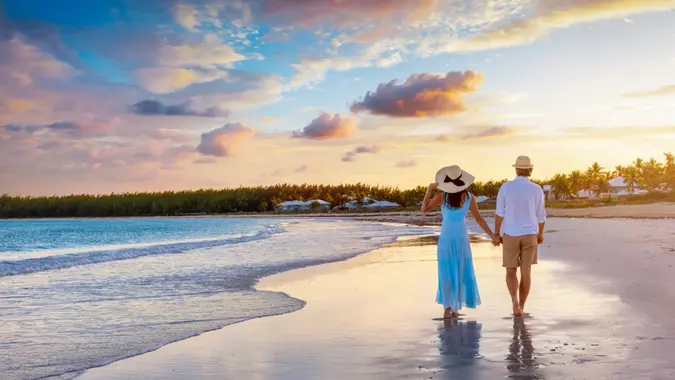7 Travel Splurges Retirees Should Pass On

Commitment to Our Readers
GOBankingRates' editorial team is committed to bringing you unbiased reviews and information. We use data-driven methodologies to evaluate financial products and services - our reviews and ratings are not influenced by advertisers. You can read more about our editorial guidelines and our products and services review methodology.

20 Years
Helping You Live Richer

Reviewed
by Experts

Trusted by
Millions of Readers
Traveling in retirement can be deeply rewarding, but certain “extras” can quietly drain a fixed-income budget.
With airfare, lodging, and dining prices rising, retirees must be strategic about where they spend their money. By skipping common travel splurges, it’s possible to free up funds for longer trips, more destinations, or unique experiences.
Here are seven travel splurges retirees should pass on.
Luxury Hotel Suites
Luxury hotel suites are a common travel splurge that can cost hundreds of dollars more per night, yet many retirees spend most of their vacation exploring rather than in their rooms. Booking a standard room at a boutique hotel or a short-term rental can deliver the same comfort at a fraction of the cost.
“Unless you are in a resort destination, you need a room with a decent bed and a bathroom,” said Anthony Damaschino, a retired traveler, author and podcast host.
Damaschino explained, “You are seeing sights throughout the day. You don’t need a spa, pools, a large room, or a big TV. Three-star hotels are an affordable option, as are Airbnb and VRBO.”
Tourist Packages
Splurging on pre-arranged tourist packages can mean paying steep markups for the convenience of a set itinerary, which can quickly strain a retiree’s travel budget.
“If you have the time, you want to maximize your money so you can have more experiences,” Damaschino said. “I’d rather have two fun-filled, engaging, and adventure-based trips vs. just one trip where I pay more to fly, sleep, and have expensive, forgettable meals.”
As an alternative, he recommended affordable biking tours. They typically cost $25 to $100 for a few hours or a full day, which offers a richer, more immersive view of the city or countryside.
“I’ve done this all over the world and never once been disappointed,” Damaschino said.
Premium Airfare
Splurging on first-class or business seats for short flights often yields minimal added comfort at a high price. Similarly, paying extra to reserve an airline seat in advance can be an extra expense.
“Unless you are focused on sitting at a particular seat, don’t spend the money to get an airline seat in advance,” said Norm Bour, a retiree, full-time nomad, and travel journalist living on Social Security. “We’ve taken hundreds of flights since we left the U.S. in 2019, and it hasn’t happened yet.”
Retirees can save significantly by choosing an economy with extra legroom or airlines known for more spacious seating.
Souvenirs and Photo Packages
Souvenirs from tourist hot spots and duty-free shops are often overpriced and mass-produced, making them an easy travel splurge to skip.
The same goes for add-ons like digital photo packages at resorts or landmarks.
“I’m a sucker for the printed group photo, but it’s just a keepsake,” said David Ciccarelli, the CEO of Lake.com, a vacation rental platform. “The extra price, often another $20, for a dozen similar photos just isn’t worth it.”
Instead of paying extra for bulk digital photo packages, retirees can capture their own images or select a single printed keepsake, then use the savings for meaningful souvenirs from local artisans or markets that truly reflect the destination.
Resort Dining
Eating every meal at a resort restaurant can be a splurge that quickly doubles a retiree’s food budget.
“Dining adds up quickly, especially in popular tourist destinations where options are limited,” said Fiorella Yriberry, a travel expert at RVshare. “Food is often an overlooked area when planning a vacation, and one that will quickly make your budget go over.”
Booking accommodations with a kitchen, such as a vacation home or RV rental, allows you to prepare some meals on-site. This approach saves money, supports dietary needs, and frees up part of the food budget for memorable culinary experiences.
All-Inclusive Packages
Splurging on all-inclusive packages can be a poor value if travelers don’t take full advantage of included meals, amenities, or activities.
Retirees who prefer exploring off-site or have specific dining preferences may end up paying for benefits they won’t use. Booking à la carte or opting for smaller meal plans can free up funds for excursions and experiences that better align with personal interests.
Travel Insurance Add-Ons
Travel insurance add-ons sold through airlines or booking platforms can be an unnecessary splurge and provide less coverage than standalone policies.
Retirees can compare travel insurance coverage from third-party providers or review existing credit card benefits to find better protection at a lower cost. Avoiding overpriced, limited-coverage add-ons leaves more money available for the trip itself.
More From GOBankingRates
 Written by
Written by  Edited by
Edited by 

























